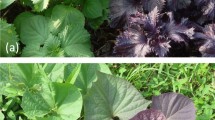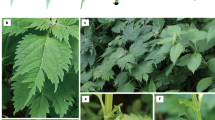Abstract
The fast touch-induced folding of leaves in sensitive plants may function for deterring herbivores, but it relies on energetically costly action potentials and interferes with photosynthesis. Here, we tested whether the intensity of the folding response in Mimosa pudica was modulated based on previous experiences, and whether the modulation was dependent on the probability of exposure to herbivores or pollinators. Younger leaves (under higher herbivory risk) reopened faster with repetitions but showed complete folding at all trials, which should be more effective as defense, but limits light exposure for longer; older leaves changed from complete to partial folding with trials, but maintained similar reopening times, which should decrease loses in photosynthesis but is less effective as defense. Unlike leaves away from inflorescences, leaves near inflorescences (i.e. more likely to be touched by flower visitors, a non-damaging stimulus) marginally decreased reopening times and shifted from complete to partial folding, a combination that decreases to the least the time leaves are light limited. All leaves showed an increased response when a new stimulus was presented after the repeated trials, suggesting that the decrease in response after repeated stimulation was not caused by mechanism exhaustion. This study shows habituation-like plasticity in a plant thigmonastic response that conforms to expectations of behavioral ecology theory usually applied to animals.




Similar content being viewed by others
References
Ackerly DD, Bazzaz FA (1995) Leaf dynamics, self-shading and carbon gain in seedlings of a tropical pioneer tree. Oecologia 101:289–298. doi:10.1007/BF00328814
Agrawal AA, Dubin-Thaler BJ (1999) Induced responses to herbivory in the Neotropical ant-plant association between Azteca ants and Cecropia trees: response of ants to potential inducing cues. Behav Ecol Sociobiol 45:47–54. doi:10.1007/s002650050538
Agrawal AA, Rutter MT (1998) Dynamic anti-herbivore defense in ant-plants: the role of induced responses. Oikos 83:227–236. doi:10.2307/3546834
Applewhite PB (1972) Behavioral plasticity in the sensitive plant, Mimosa. Behav Biol 7:47–53. doi:10.1016/S0091-6773(72)80187-1
Bates D, Maechler M and Bolker B (2012) lme4: linear mixed-effects models using S4 classes. R package version 0.99-0. http://CRAN.R-project.org/package=lme4. Retrieved 06 Mar 2013
Bose JC (1914) An automatic method for the investigation of velocity of transmission of excitation in Mimosa. Philos Trans R Soc Lond Ser B Contain Pap Biol Character 204:63–97. doi:10.2307/92010
Bose JC (1926) The nervous mechanism of plants. Longmans Green, London
Bose JC, Das SC (1916) Physiological investigations with petiole-pulvinus preparations of Mimosa pudica. Proc R Soc Lond Ser B Contain Pap Biol Character 89:213–231. doi:10.2307/80847
Braam J (2005) In touch: plant responses to mechanical stimuli. New Phytol 165:373–389. doi:10.1111/j.1469-8137.2004.01263.x
Cahill JF, Bao T, Maloney M, Kolenosky C (2013) Mechanical leaf damage causes localized, but not systemic, changes in leaf movement behavior of the Sensitive Plant, Mimosa pudica (Fabaceae) L. Botany 91:43–47. doi:10.1139/cjb-2012-0131
Christianini AV, Machado G (2004) Induced biotic responses to herbivory and associated cues in the Amazonian ant-plant Maieta poeppigii. Entomol Exp Appl 112:81–88. doi:10.1111/j.0013-8703.2004.00188.x
Coley PD, Barone JA (1996) Herbivory and plant defenses in tropical forests. Annu Rev Ecol Syst 27:305–335. doi:10.2307/2097237
Conrath U, Beckers GJM, Flors V et al (2006) Priming: getting ready for battle. Mol Plant Microbe Interact 19:1062–1071. doi:10.1094/MPMI-19-1062
de Kroon H, Huber H, Stuefer JF, Van Groenendael JM (2005) A modular concept of phenotypic plasticity in plants. New Phytol 166:73–82. doi:10.1111/j.1469-8137.2004.01310.x
Eisner T (1981) Leaf folding in a sensitive plant: a defensive thorn-exposure mechanism? Proc Natl Acad Sci 78:402–404
Fleurat-Lessard P, Bouche-Pillon S, Leloup C, Bonnemain JL (1997) Distribution and activity of the plasma membrane h + -atpase in Mimosa pudica in relation to ionic fluxes and leaf movements. Plant Physiol 113:747–754. doi:10.1104/pp.113.3.747
Fromm J (1991) Control of phloem unloading by action potentials in Mimosa. Physiol Plant 83:529–533. doi:10.1111/j.1399-3054.1991.tb00130.x
Fromm J, Lautner S (2006) Characteristics and functions of phloem-transmitted electrical signals in higher plants. In: Baluška DF, Mancuso DS, Volkmann DD (eds) Communication in plants. Springer, Berlin Heidelberg, pp 321–332
Ghazoul J (2001) Can floral repellents pre-empt potential ant–plant conflicts? Ecol Lett 4:295–299. doi:10.1046/j.1461-0248.2001.00229.x
Groves PM, Thompson RF (1970) Habituation: a dual-process theory. Psychol Rev 77:419–450. doi:10.1037/h0029810
Hamilton JG, Zangerl AR, De Lucia EH, Berenbaum MR (2001) The carbon–nutrient balance hypothesis: its rise and fall. Ecol Lett 4:86–95. doi:10.1046/j.1461-0248.2001.00192.x
Heard TA, Paynter Q, Chan R, Mira A (2005) Malacorhinus irregularis for biological control of Mimosa pigra: host-specificity, life cycle, and establishment in Australia. Biol Control 32:252–262. doi:10.1016/j.biocontrol.2004.10.003
Hoddinott J (1977) Rates of translocation and photosynthesis in Mimosa pudica L. New Phytol 79:269–272. doi:10.1111/j.1469-8137.1977.tb02204.x
Janzen D (1991) Mimosa pigra (Zarza, Dormilona). Historia Natural Costa Rica. Janzen DH (ed), p 776–778
Jensen EL, Dill LM, Cahill JFC (2011) Applying behavioral-ecological theory to plant defense: light-dependent movement in Mimosa pudica suggests a trade-off between predation risk and energetic reward. Am Nat 177:377–381. doi:10.1086/658343
Karban R (2008) Plant behaviour and communication. Ecol Lett 11:727–739. doi:10.1111/j.1461-0248.2008.01183.x
Koller D (2011) The restless plant. Harvard University Press, Cambridge
Koziolek C, Grams TEE, Schreiber U et al (2004) Transient knockout of photosynthesis mediated by electrical signals. New Phytol 161:715–722. doi:10.1111/j.1469-8137.2004.00985.x
Kursar T, Coley P (2003) Convergence in defense syndromes of young leaves in tropical rainforests. Biochem Syst Ecol 31:929–949. doi:10.1016/S0305-1978(03)00087-5
Kuznetsova A, Brockhoff and Bojesen Christensen R (2013) lmerTest: Tests for random and fixed effects for linear mixed effect models (lmer objects of lme4 package). R package version 1.1-0
Lautner S, Stummer M, Matyssek R et al (2013) Involvement of respiratory processes in the transient knockout of net CO2 uptake in Mimosa pudica upon heat stimulation. Plant Cell Environ 37:254–260. doi:10.1111/pce.12150
Metlen KL, Aschehoug ET, Callaway RM (2009) Plant behavioural ecology: dynamic plasticity in secondary metabolites. Plant Cell Environ 32:641–653. doi:10.1111/j.1365-3040.2008.01910.x
Peng Y-B, Li Y-Q, Hao Y-J et al (2004) Nectar production and transportation in the nectaries of the female Cucumis sativus L. flower during anthesis. Protoplasma 224:71–78
Pickard BG (1973) Action potentials in higher plants. Bot Rev 39:172–201. doi:10.2307/4353850
R Core Team (2013) R: A language and environment for statistical computing. R Foundation for Statistical Computing, Vienna, Austria. ISBN 3-900051-07-0, URL http://www.R-project.org/
Raine NE, Willmer P, Stone GN (2002) Spatial structuring and floral avoidance behavior prevent ant–pollinator conflict in a Mexican ant-acacia. Ecology 83:3086–3096. doi:10.2307/3071844
Rankin CH, Abrams T, Barry RJ et al (2009) Habituation revisited: an updated and revised description of the behavioral characteristics of habituation. Neurobiol Learn Mem 92:135–138. doi:10.1016/j.nlm.2008.09.012
Strauss SY, Rudgers JA, Lau JA, Irwin RE (2002) Direct and ecological costs of resistance to herbivory. Trends Ecol Evol 17:278–285. doi:10.1016/S0169-5347(02)02483-7
Trewavas A (2009) What is plant behaviour? Plant Cell Environ 32:606–616. doi:10.1111/j.1365-3040.2009.01929.x
Acknowledgements
We thank the coordinators of the ETC 02-13 “viajesan” field course, Alejandro Farji-Brener and Federico Chinchilla, for making this project possible. We thank Katherine Amador and Audrey Amador for assistance locating field sites; Catalina Salazar and Esteban Ramírez for valuable help in the field; Conservation Land Trust and Carlos Figuerero for let us work at their field stations; Ulrich Mueller, Brian Barret, Emma Dietrich, Melissa Kardish, Chi-Chun Fang, Rong Ma, Quinn McFrederick, and an anonymous reviewer for comments to earlier versions of this manuscript. The Organization for Tropical Studies provided logistical and financial support.
Conflict of interest
The authors declare that they have no conflict of interest.
Author information
Authors and Affiliations
Corresponding author
Additional information
Communicated by K.-F. Cao.
Rights and permissions
About this article
Cite this article
Amador-Vargas, S., Dominguez, M., León, G. et al. Leaf-folding response of a sensitive plant shows context-dependent behavioral plasticity. Plant Ecol 215, 1445–1454 (2014). https://doi.org/10.1007/s11258-014-0401-4
Received:
Accepted:
Published:
Issue Date:
DOI: https://doi.org/10.1007/s11258-014-0401-4




